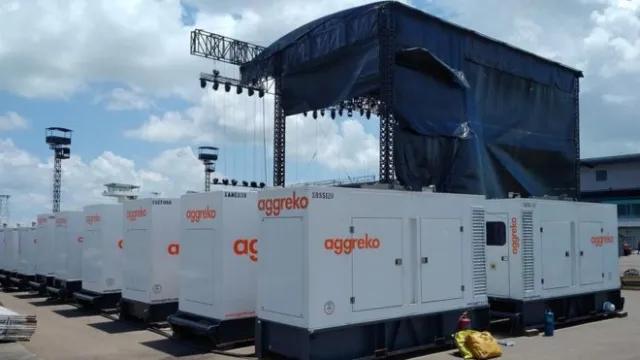Olympics power firm Aggreko challenged to cut carbon
Aug 17, 2019 11:55 AM ET

The global firm which helps keep the lights on at the Olympics and Glastonbury music festival says it is being challenged by customers to cut carbon.
Aggreko, which supplies temporary power generators to high-profile events around the world, is putting 10% of its profits into new technology.
The Glasgow-based company has traditionally used diesel-power.
But it is now increasing the use of solar technology and storage batteries.
Robert Wells, who looks after Aggreko's events business, said clients running events such as the Open golf competition and Rugby World Cup were looking for ways to reduce their carbon footprint.
'Rapid change'
"They are challenging us on a daily basis as to where can we introduce renewable storage, solar, even renewable fuels," he told BBC Radio's Good Morning Scotland programme.
"This year in the UK we have burned more hydrotreated vegetable oil than at any other time."
Aggreko is already working on a £159m contract to supply temporary power for the Tokyo 2020 Olympic and Paralympic Games.
Speaking from Aggreko's Dumbarton base, Mr Wells said: "We had some solar hybrid units at a number of jobs this year the Open championship and Glastonbury.
"Our new equipment - even if it's using traditional fossil fuels, has to be at the forefront of emissions legislation.
"We're driving the engine manufacturers to give us cleaner engines as early as possible."
Mr Wells also said the technology for storing renewably-generated power in giant batteries was "evolving rapidly".
Aggreko's manufacturing chief Aine Finlayson said the company was focusing on a mixture of traditional engines, batteries and solar.
"We have to design these so they're bespoke to what the customer needs, whether its a mine in Australia, or in a remote territory in the Amazon," she said.
"More and more research and development is coming to the fore of what we do. This business has invested about 10% of its profit per year on new product."
Mr Wells added: "You couldn't rely just on solar. Similarly you don't want to rely just on fossil fuel generation.
"I expect next year we will have more greener hybrid solar solutions at our events than we've had this year.
"One thing you've got to remember with events - it's great having it, but one thing's for certain - they don't want the power to fail."
Also read

